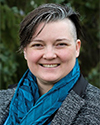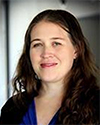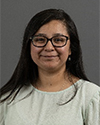Partnerships for Environmental Public Health (PEPH)
August 23, 2023 • 1:00 p.m. ET
In this webinar, second of the two-part series, we heard about two more projects that are improving environmental public health through mobile app development.

Nadia Pack, with the ChicAgo Center for Health and EnvironmenT (CACHET), and Jill Johnston, Ph.D., with the University of Southern California (USC), talked about their experience with the development and validation of a user-friendly mobile app, EnviroReportTM. The app is used by community members to report in real-time, specific GPS-tagged places of environmental incidences documented with descriptors, photos, and air monitor uploads. Data is sent to CACHET servers for analysis and report-backs to communities. Daily reports are uploaded to Chicago 311 for response and intervention, and collated reports are provided to the Chicago Department of Public Health for city-wide environmental monitoring.
Jennifer Carrera, Ph.D., with Michigan State University (MSU), talked about her experience working with a team of six Flint, Michigan, residents to develop a mobile application to advance community knowledge collection, development, and goal sharing. Carrera worked with a team of Flint residents to determine:
- Ethical considerations in the storing and sharing of that information.
- How best to collect desired data.
- What information was meaningful to the community.
- What the data means and its implications for individuals, households, and the community.
The final version of the app allowed participants to enter data, save data locally to the device, send data to Google Sheets, record location information, and save a place marker on a map. Ultimately, the process was not about producing an app with a life of its own but organizing the community through an app development process to consider knowledge production as a community.
Experts

Jennifer Carrera, Ph.D., is an assistant professor of sociology and environmental science and policy at MSU. Her research focuses on environmental issues around water access and water quality, with an emphasis on low-income communities in the United States. Carrera’s research interests focus on community capacity to lead environmental health research and the pathways through which academic partners can support these research agendas. Carrera is currently engaged in community based participatory research with partners in Flint, Michigan. This work considers the local knowledge of Flint residents in responding to a public health crisis and the implications that this knowledge has on the broader understanding of environmental health literacy. Additionally, particularly through her environmental engineering partnerships, she is interested in increasing capacity for sympathetic academics to support the leadership directions of communities in the pursuit of community expressed needs and goals.

Jill Johnston, Ph.D., is an associate professor and Director of Community Engagement in the Division of Environmental Health at USC. Her research focuses on addressing unequal exposures to harmful contaminants that affect the health of working poor and communities of color. Johnston engages in collaborations with grassroots organizations to conduct community-engaged action-oriented research at USC. She works towards strong partnership with local organizations, community health promotores, policymakers, and residents to address air pollution, upstream oil and gas extraction and incompatible land use.

Nadia Pack is the program manager for CACHET, a NIEHS P30 center and a cross town partnership between the University of Illinois Chicago (UIC) and University of Chicago. Since joining UIC in 2016, Nadia has used her public health background in various research and educational community efforts, including the Illinois Department of Public Health Childhood Asthma Initiative and All of Us. She bridges collaborations with underserved communities and guides project/research implementation. Nadia obtained a B.S. from the University of Illinois at Urbana-Champaign in community health and rehabilitation studies with a minor in interdisciplinary aging, she is currently pursuing a master’s degree in epidemiology with a focus on environmental health.
We Want Your Feedback!
Send comments, questions, and suggestions for future webinar topics to [email protected].


